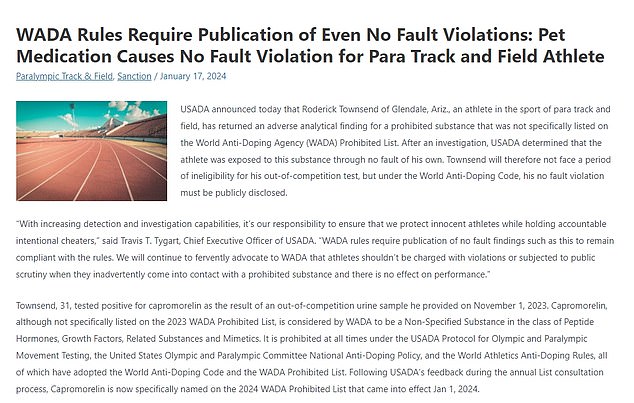Paralympic star who took his DOG’S medication after sharing a syringe with his dying pet is cleared of doping – and free to compete at Paris 2024
- In November 2023, Paralympic track and field athlete Roderick Townsend tested positive for capromorelin, a growth hormone stimulator.
- He has now been exonerated, with his deceased dog key to the USADA investigation
- The substance had been administered to the dog to help regulate its weight
Three-time Paralympic gold medalist will be allowed to compete in the 2024 Paris Games after being cleared by the US Anti-Doping Agency for using a banned substance.
Roderick Townsend tested positive for capromorelin on November 1, 2023 – a growth hormone stimulant prohibited at all times under the USADA Protocol for Olympic and Paralympic Exercise Testing.
But upon investigation, it turns out that all was not as it seemed and that Townsend provided an abnormal sample through no fault of his own.
a USADA investigation into Townsend discovered that the athlete had given his now deceased dog a specific drug containing capromorelin.
Townsend, who suffered permanent nerve damage to his right arm and shoulder at birth, provided evidence of a prescription liquid pet medication containing the substance while trying to stabilize his dog’s ailing weight.
American Paralympic star Roderick Thompson has been cleared to compete at Paris 2024

Thompson’s dog Winnie, pictured on his Instagram page in a February 2021 post

USADA released a statement clearing his name, explaining the reasons why he returned an unfavorable out-of-competition test result for a growth hormone stimulator in November 2023
The drug was administered orally to the dog via a syringe in its final weeks of life, before Townsend kept the syringe containing trace amounts of the drug.
The track and field star, who won gold in the high jump at the 2020 Tokyo Paralympic Games, was to use the syringe himself when measuring and taking a liquid vitamin D supplement recommended to him by his nutritionist.
He was unaware of any possible residue of the dog’s drug previously used in the syringe.
“As detection and investigation capabilities increase, it is our responsibility to ensure we protect innocent athletes while holding intentional cheaters accountable,” USADA CEO Travis T. Tygart said in a statement.
‘WADA regulations require publication of such findings without error to remain compliant.

Thompson was not at fault, as traces of his dog’s medication were the reason behind the result
“We will continue to advocate fervently at WADA that athletes should not be charged with violations or subjected to public scrutiny if they accidentally come into contact with a banned substance and there is no effect on performance.”
Townsend has a limited range of motion and his muscles in his right arm are not fully developed after the umbilical cord was wrapped around his neck during birth. He competed against able-bodied athletes until the age of 15, when he was reclassified as a Paralympic athlete.
He has now been cleared and will not face any punishment or period of ineligibility, meaning he can advance to the Paralympic Games this summer.
